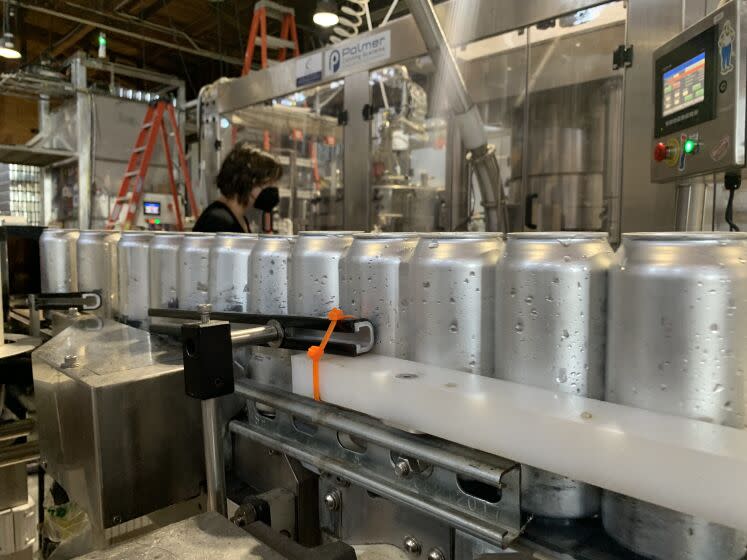Brewers need cans. California's broken recycling system is making them hard to find

Cindy Le, the operations director at Almanac Beer Co. in Alameda, had customers lining up for her Black Magic IPA and Peaceful Pils this spring. She was just running out of ways to sell it.
Cans are in short supply nationally, creating an unforeseen headache for brewers and driving up prices for drinkers. A variety of factors are driving the shortage, including pandemic lockdowns that curtailed manufacturing, supplier upheavals and a canned cocktail boom that increased demand for aluminum.
Another reason: California’s creaking recycling system can’t collect enough cans, one consequence of a program that has been crippled by redemption center closures and out-of-date policies that have made it harder for people to recycle effectively.
The chronic shortage highlights how an overlooked link in the supply chain — trash — can hamstring a beloved, and booming, industry.
About 73% of an aluminum can comes from recycled scrap. As demand for canned beverages boomed in recent years, the state’s patchwork of recycling centers and recovery facilities just couldn’t keep pace.
In the last five years, California’s recycling rate for aluminum cans has fallen 20%, from 91% in 2016 to 73% in 2021, according to data from the California Department of Resources Recycling and Recovery, or CalRecycle.
“The problem that we have, particularly in the United States on cans, is that we don't recycle them enough,” said Matt Meenan, vice president of external affairs at the Aluminum Assn. The overall can recycling rate in the U.S. is 45%, meaning that more than half of the cans wind up in landfills.
In California, the situation has deteriorated precipitously. In 2016, according to the state’s data, slightly more than 766 million aluminum cans wound up in landfills or never got recycled. Last year, the number was 2.8 billion. That’s enough cans to fill about 31,000 backyard swimming pools.
Experts said the beer business could come to a standstill without a steady supply of cans, and smaller businesses are the most vulnerable.
“[If] we don't have beer to send to our distributors, we don't have beer to sell over the bar in our tap room,” Le said. “It creates that domino effect of us not being able to sell beer or make money. That’s the real disruption.”
Amid the shortage, one of the biggest can makers in the U.S, Broomfield, Colo.-based Ball Corp., said last fall that it would no longer handle small or even mid-size orders. “Ball implemented a minimum order of five truckloads, which is like 5 million cans,” said Bart Whipple, supply-chain manager at Sierra Nevada Brewing Co. in Chico. “[For] smaller places, that's a lifetime supply.”
That set off alarms at Huntington Beach-based Beachwood Brewing.
“Ball gave us essentially a two-week notice that we had to order all the cans for the next year,” co-owner and brewmaster Julian Shrago said. He decided to spend much of the company’s cash reserves on the cans and paid upfront. And still, it wasn’t clear when his supply would arrive.
Industrywide, the issue with vendors was “‘you can’t get this now,’ you’re going to have to wait twice as long,” Shrago said. “Then it became three times as long and then four times as long. It wasn’t that we weren’t able to get products; our lead times increased and our cost increased.”
Both Beachwood Brewing and Almanac Beer Co. scrambled to get what cans they could, paying a premium and averting a business standstill. "If we weren't able to can beer, then we had no beer to sell," said Le, who two years ago was paying 13 cents a can. By this spring, cans were selling for 22 cents each. With roughly 1.86 million cans purchased annually, Almanac's can costs shot up by approximately $167,400 in less than two years.
When costs balloon that way, "eventually we have to pass it down to the customer,” Shrago said.
Although the can crisis exploded during the pandemic, it has been years in the making.

 Yahoo Autos
Yahoo Autos 